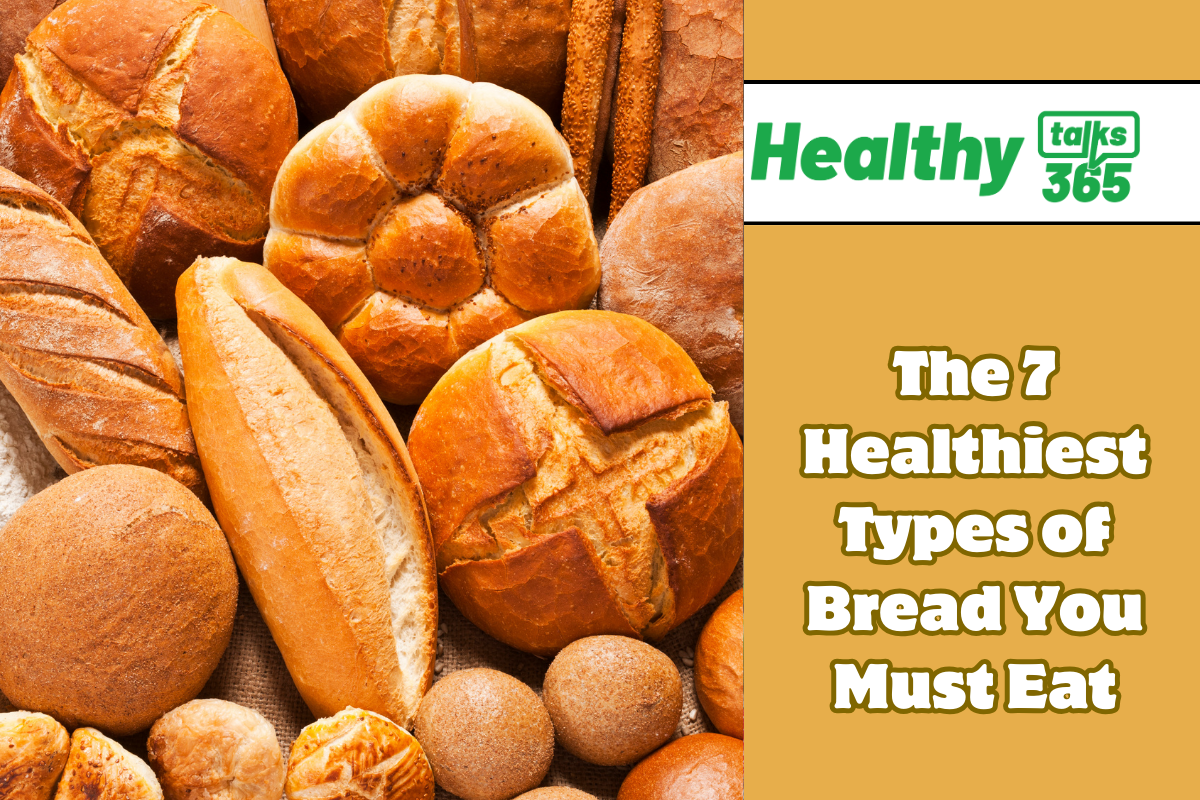The 7 Healthiest Types of Bread You Must Eat
1. Whole Wheat Bread
Whole wheat bread is made from whole grains, retaining the nutrient-rich bran and germ. It’s higher in fiber, vitamins (such as B vitamins and vitamin E), minerals (like magnesium and iron), and phytonutrients compared to refined white bread. The fiber content aids digestion, promotes satiety, and helps regulate blood sugar levels.
Whole wheat bread stands out for its nutritional profile, derived from whole grains that retain the bran and germ layers. These components are rich in fiber, which supports digestive health by promoting regular bowel movements and aiding in satiety. Additionally, whole wheat bread contains essential vitamins such as B vitamins (like folate and riboflavin) and vitamin E, crucial for energy metabolism and skin health, respectively.
Minerals like magnesium and iron are also abundant, supporting various bodily functions including muscle function and oxygen transport in the blood. Phytonutrients found in whole wheat bread, such as antioxidants, help combat oxidative stress and inflammation, contributing to overall health and disease prevention. By choosing whole wheat bread over refined white bread, individuals benefit from sustained energy levels and improved nutrient intake, making it a cornerstone of a balanced diet.

Read Also:
Focus While Studying: 10 Proven Methods
2. Sprouted Grain Bread
Sprouted grain bread is made from whole grains that have started to germinate or sprout. Sprouting can enhance nutrient absorption and increase levels of vitamins, minerals, and antioxidants. Sprouted grain bread is easier to digest and may have a lower glycemic index compared to regular whole wheat bread.
Sprouted grain bread offers a unique nutritional profile due to the sprouting process, where grains release enzymes that break down starches into simpler sugars and unlock essential nutrients. This process enhances the bioavailability of vitamins, such as B vitamins (including folate and niacin), minerals like iron and zinc, and antioxidants such as vitamin C and beta-carotene.
Sprouted grain bread is also easier to digest compared to traditional whole wheat bread, making it suitable for individuals with digestive sensitivities. Its lower glycemic index aids in regulating blood sugar levels, promoting sustained energy and reducing the risk of insulin spikes. By incorporating sprouted grain bread into one’s diet, individuals can enjoy improved nutrient absorption, digestive comfort, and sustained energy throughout the day.
3. Sourdough Bread
Sourdough bread is made through a fermentation process using naturally occurring lactobacilli and yeast. This fermentation process breaks down gluten and phytic acid, making sourdough easier to digest and enhancing nutrient absorption. It has a lower glycemic index and may be tolerated better by individuals with gluten sensitivity.
Sourdough bread distinguishes itself through a fermentation process involving natural lactobacilli and yeast, which impart its characteristic tangy flavor and unique texture. This fermentation process breaks down gluten and phytic acid, enhancing nutrient absorption and easing digestion. As a result, sourdough bread is often tolerated better by individuals with gluten sensitivity or mild intolerance.
Its lower glycemic index compared to conventional bread varieties helps stabilize blood sugar levels and prolong feelings of fullness, making it a suitable option for weight management and diabetes prevention. Sourdough bread’s beneficial bacteria promote gut health by supporting a balanced microbiome, which contributes to overall immune function and digestive wellness. Incorporating sourdough bread into a balanced diet not only satisfies taste preferences but also supports optimal digestion and overall well-being.
4. Rye Bread
Rye bread is made from rye grains, which are denser and have a distinctive, slightly sour flavor. It’s higher in fiber than wheat bread and contains beneficial compounds like lignans and resistant starch. Rye bread has a lower glycemic index, which can help regulate blood sugar levels and promote satiety.
Rye bread stands out for its dense texture and slightly sour flavor, derived from rye grains that offer unique nutritional benefits. Rich in fiber, rye bread promotes digestive health by aiding in regular bowel movements and supporting satiety, making it a satisfying option for weight management. Its lower glycemic index compared to wheat bread helps regulate blood sugar levels, reducing the risk of insulin spikes and supporting long-term metabolic health.
Rye bread contains lignans, plant compounds with antioxidant properties that help combat oxidative stress and inflammation in the body. Additionally, rye bread’s resistant starch content serves as a prebiotic, supporting the growth of beneficial gut bacteria and promoting gut health. By incorporating rye bread into the diet, individuals can benefit from sustained energy levels, improved digestive function, and enhanced overall health.
Read Also:
11 Best Ways to Improve Your Digestion
5. Oat Bread
Oat bread is made from oats, which are rich in soluble fiber called beta-glucan. Beta-glucan helps lower cholesterol levels, regulate blood sugar levels, and promote digestive health. Oats also provide vitamins, minerals, and antioxidants, making oat bread a nutritious choice.
Oat bread, crafted from oats renowned for their high fiber content and beta-glucan, offers a host of health benefits. Beta-glucan, a soluble fiber, helps lower cholesterol levels by binding to bile acids and promoting their excretion from the body. This action supports cardiovascular health and reduces the risk of heart disease. Oats also contribute essential vitamins and minerals such as vitamin E, zinc, and magnesium, which support immune function, skin health, and muscle function, respectively.
Antioxidants found in oats combat oxidative stress and inflammation, contributing to overall disease prevention and promoting longevity. Oat bread’s high fiber content promotes digestive health by regulating bowel movements and aiding in weight management through increased satiety. By incorporating oat bread into a balanced diet, individuals can enjoy sustained energy levels, improved heart health, and enhanced overall well-being.

6. Flaxseed Bread
Flaxseed bread is made from ground flaxseeds, which are high in omega-3 fatty acids, fiber, and lignans (antioxidant compounds). Omega-3 fatty acids support heart health, while fiber promotes digestive health and helps regulate cholesterol levels. Flaxseed bread adds a nutty flavor and dense texture to your diet.
Flaxseed bread stands out for its high content of omega-3 fatty acids, fiber, and lignans, making it a nutritious addition to the diet. Omega-3 fatty acids, primarily alpha-linolenic acid (ALA), support heart health by reducing inflammation, improving cholesterol levels, and supporting normal heart rhythm. Fiber in flaxseed bread promotes digestive health by aiding regular bowel movements and supporting gut flora balance.
Lignans, antioxidant compounds found in flaxseeds, help protect against oxidative stress and may play a role in reducing the risk of certain cancers. Flaxseed bread’s dense texture and nutty flavor add variety to the diet while offering essential nutrients that contribute to overall health and well-being. By incorporating flaxseed bread into a balanced diet, individuals can benefit from improved heart health, digestive function, and antioxidant protection.
7. Multigrain Bread
Multigrain bread is made from multiple grains, such as wheat, barley, oats, and seeds. It offers a variety of nutrients from different grains, including fiber, vitamins, minerals, and antioxidants. When choosing multigrain bread, ensure it contains whole grains rather than refined grains for maximum health benefits.
Multigrain bread, crafted from a blend of various grains such as wheat, barley, oats, and seeds, offers a diverse array of nutrients essential for health and well-being. Each grain contributes unique vitamins, minerals, and antioxidants that collectively support optimal body function. Multigrain bread is rich in dietary fiber, promoting digestive health by supporting regular bowel movements and aiding in weight management through increased satiety. Its blend of grains provides essential B vitamins, such as folate and niacin, which support energy metabolism and nervous system function.
Minerals like iron, zinc, and magnesium contribute to various physiological processes, including oxygen transport, immune function, and muscle health. Antioxidants found in multigrain bread combat oxidative stress and inflammation, protecting cells from damage and reducing the risk of chronic diseases. When selecting multigrain bread, choosing varieties made from whole grains ensures maximum nutrient content and health benefits. By incorporating multigrain bread into the diet, individuals can enjoy sustained energy levels, improved digestive function, and enhanced overall health and well-being.




